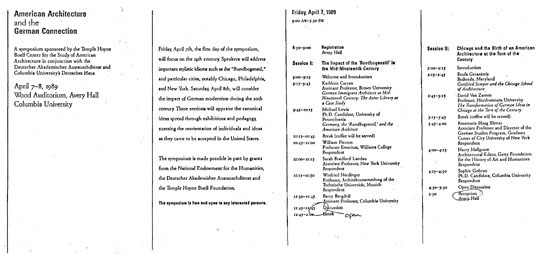
April 7-8, 1989
Wood Auditorium, Avery Hall
The Temple Hoyne Buell Center for the Study of American Architecture, a part of the Graduate School of Architecture, Planning and Preservation at Columbia University in the City of New York, announced a major symposium on "American Architecture and the German Connection" in early April of 1989. Long overlooked by historians, the influence of German architects, theories, designs, and educational curricula had recently emerged as an active field of research on both sides of the Atlantic. This symposium considered architects who emigrated from Germany to the United States as well as the influences of publications, offices, and classroom studios. One major theme was the shift from the direct transmission of ideas and images to their subtle transformation in this new setting.
Friday, April 7th, the first day of the symposium, focused on the 19th century. Speakers addressed important stylistic idioms such as the "Rundbogenstil," and particular cities, notable Chicago, Philadelphia, and New York. Saturday, April 8th, considered the impact of German modernism during the 20th century. These sessions appraised the canonical ideas spread through exhibitions and pedagogy and stressed the reorientation of individuals and ideas as they came to be accepted in the United States.
The symposium was made in part by grants from the National Endowment for the Humanities, the Deutscher Akademisher Austauschdienst, and the Temple Hoyne Buell Foundation.
Friday, April 7
Session I: The Impact of the 'Rundbogenstil' in the Mid-Nineteenth Century
9:00- 9:15 Welcome and Introduction
9:15 - 9:45
Kathleen Curran, Brown University, "German Immigrant Architects at Mid-Nineteenth Century: The Astor Library as a Case Study"
9:45 - 10:15
Michael Lewis, University of Pennsylvania, "Germany, the 'Rundbogenstil,' and the American Architect"
10:15 - 10:45 Coffee Break
10:45 - 11:00
Response: William Pierson, Williams College
11:00 - 11:15
Response: Sarah Bradford Landau, NYU
11:15 - 11:30
Response: Winfried Nerdinger, Technische Universität (Munich)
11:30 - 11:45
Barry Bergdoll, Columbia University
11:45 - 12:45 Open discussion
12:45 - 2:00 Lunch
Session II: Chicago and the Birth of an American Architecture at the Turn of the Century
2:00 - 2:15 Introduction
2:15 - 2:45
Roula Geraniotis, Bethesda, Maryland, "Gottfried Semper and the Chicago School of Architecture"
2:45 - 3:15 Coffee Break
3:45 - 4:00
Response: Rosemarie Haag Bletter, City University of New York
4:00 - 4:15
Response: Harry Mallgrave, Getty Foundation
4:15 - 4:30
Response: Sophie Gobran, Columbia University
4:30 - 5:30 Open Discussion
Followed by a reception.
Saturday, April 8
Session III: Modernism in America before the Exhibition of "Modern Architecture" at the Museum of Modern Art in 1932
9:00 - 9:15 Welcome and Introduction
9:15 - 9:45
Rosemarie Haag Bletter, City University of New York, "The Impact of German Modernism before 1932"
9:45 - 10:15
Paul Krurv, University of Illinois, "Germany, Austria and the Prairie School"
10:15 - 10:45 Coffee break
10:45 - 11:00
Response: David Handlin, David Handlin, and Associates
11:00 - 11:15
Response: Gregory Gilmartin, co-author of "New York 1900 and New York 1930"
11:15 - 11:30
Response: Wim de Wit, Chicago Historical Society
11:30 - 12:30 Open Discussion
12:30 - 1:45 Lunch
Session IV: The Legacy of the German Emigres after 1933
1:45 - 2:00 Introduction
2:00 - 2:30
Richard Pommer, NYU, "The Sea Change in the Idea of the International Style"
2:30 - 3:00
Franz Schulze, Lake Forest College, "The Changing Character of Mies van der Rohe's Architecture in America"
3:00 - 3:30
Winfried Nerdinger, Technische Universität (Munich), "Walter Gropius' Changing Approach to Architectural Education at the Bauhaus and Harvard"
3:30 - 4:00 Coffee break
4:00 - 4:15
Barbara Miller Lane, Bryn Mawr College, Respondent
4:15 - 4:30
Christian Otto, Cornell University, Respondent
4:30 - 4:45
Isabelle Hyman, NYU, Respondent
4:45 - 5:45 Open Discussion
Followed by a reception.
